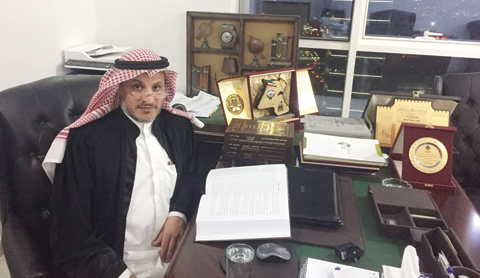'Higher divorce rates linked to "fast changes in reality, coupled with trends in technology": lawyer says.'
 Dr Ahmed Batahi Al-Mutairi
Dr Ahmed Batahi Al-MutairiDivorce is one of many issues handled by attorney Dr Ahmed Batahi Al-Mutairi. But he believes that helping families resolve their legal disputes is his strength, and he enjoys his work. According to him, the trend of increasing divorce rates is universal, noting that Kuwait has a high number of divorce cases too. "This I think is related to the fast changes in reality, coupled with trends in technology," he said.
An article published by Kuwait Times recently said the rate of divorce in Kuwait has climbed to 60 percent, but Mutairi rejected this report, claiming that it's only 30 percent. "The reason behind this is the very nature of man, who feels superior to a woman. They want to reaffirm their manhood by showing their superiority over women. But this is also influenced by social media trends - communication is turning marriages upside down nowadays," he said.
Mutairi, 47, is an active lawyer, and was a judge at the court of cassation from 1997 to 2001. He completed his university degree at the Islamic University of Madinah in Saudi Arabia and his PhD at Al-Jinan University in Lebanon. For many years, the ministry of justice in Kuwait was his second home, where he was assigned to render judgments on many cases. In 2012, he decided to start his own law firm, which consists of four outstanding lawyers, two consultants and six office staff.
Every morning, before going to work, Mutairi prepares himself for another challenging day, and prays for wisdom and for his family. "I pray regularly to ask Allah for guidance when deciding a case. I always decide with full honesty and do what is best based on our law and responsibility as a human being," he told Kuwait Times.
Mutairi has a fixed daily schedule. From waking up to drinking coffee, from reading the local newspapers to perusing the pile of documents on his desk, everything has a fixed time. At 8 am, the court opens, and his normal workday ends at noon. "At 1 pm, I talk to the families or witnesses and schedule meetings with case officers or attorneys and deliberate on the merits of the case," he said.
Even though he has his own law firm now, Mutairi is always on the go. "I have many plans for the day. I don't sleep if I don't finish my objectives for the day. I don't step out if I haven't accomplished my goals. I share the same approach with the people I am working with," he said. His law firm, which is located across the ministry of justice, has handled many extramarital affairs and divorce cases. "The bottom line is that all we humans want is to be happy and content in life - this is why my firm believes in helping people as much as we can."
By Ben Garcia










